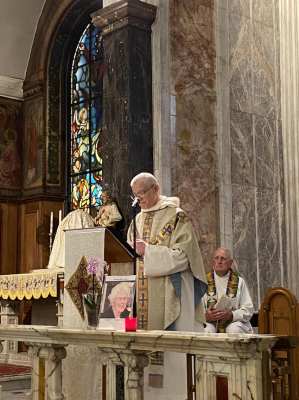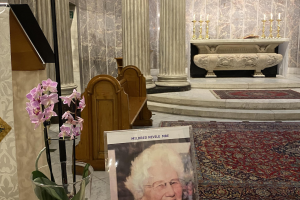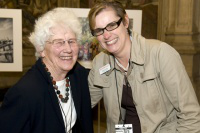Text: Fr Richard Finn OP at Memorial Mass of Mildred Nevile

Fr Richard Finn. Image ICN/JS
Fr Richard Finn OP, gave the following sermon for the Memorial Mass of Mildred Nevile on the tenth anniversary of her death, on Saturday, 1 October, at St Mary Moorfields church in London.
Mary sings God's praises - that's for sure! But what else is she doing? It helps in reaching for an answer to be more specific. She praises God as the champion of the poor, the Holy One who has rescued His downtrodden people Israel. This hymn of victory or paean lauds the God who raised up Joseph from slavery, who brought Moses, Miriam, and Aaron through the wilderness, who fed the hungry Israelites with manna in the desert, quenched their thirst with water from the rock. It is God who pulled down the kings who abandoned the covenant, God who raised up the despised prophet Jeremiah from the cistern in which he had been left to starve.
But that's clearly not all there is to say - sorry! In the context of Mary's visitation to Elizabeth, the miraculous pregnancy of these two women, God is being praised as the One who will now redeem His people in the birth and lives of these two children, the Baptist and the Christ child. The hymn is also a prophecy. As with the prophet Micah in our first reading the past is recalled not for its own sake but to found our hope for the future. And what Mary prophesies is not simply the next chapter in the story of God's repeatedly or endlessly coming to Israel's rescue. Her act of prophecy fulfils the promise uttered by an earlier prophet Joel that in the last days God's spirit would be poured out even on the menservants and the maidservants. Mary prophesies God's final vindication of His people. She makes her own the annunciation of the Saviour first made to her by the Archangel Gabriel.
Why does this matter? Why is it important to see the Magnificat as a prophetic act? Several things come to mind. Not least is the fact that if this hymn, for all its beauty, is not a prophecy, it is at best only partially true, or true only for a very few. You do not need me to spell out the many millions who still go hungry, the obscene proportion of the world's wealth, goods, and resources, consumed by the very few, the many thousands or millions caught up in violence through invasion, civil war, gang warfare, or trafficking. How many of the rich have been sent away empty? How many of the poor have been raised up? If this hymn were not a prophecy, what good or ill might we be doing when we take it on our lips? Would it be a false consolation? An opiate for the people? An empty charade?
What's more, just as Mary is inspired to make the annunciation her own in this act of prophecy, so all of us who have received the Holy Spirit in baptism and confirmation make that annunciation our own when we make this hymn our own. We join in Mary's prophetic act.
That matters not least because to prophesy in this way is to commit ourselves to the good of what we prophesy. We commit or re-commit ourselves to seeking God's justice in the person of Christ and in His mission. Instead of the Magnificat being a partial truth about the past to serve perhaps as a false consolation in the present, the Magnificat declares our hope for the future, and our willingness as Christian disciples to play our part in the fulfilment of that prophecy. Think again of our first reading from Micah, prophecy shapes Micah's rhetorical question to his audience: what does God want if not that we 'do justice, and love kindness, and walk humbly with your God'? As social inequality deepens, as food poverty and fuel poverty worsen, the question is no less sharp for us than it was for the Israelites.
From this perspective we can better recognise and value the prophetic witness of others, especially that of Mildred Neville, for whom we offer this Mass in prayer and in thanksgiving for her life some ten years after her death in September 2012. I met her only once, and others can better speak to her achievements, but under her leadership from 1967 until 1985 the Catholic Institute for International Relations, CIIR, became itself an inspired and inspiring prophetic instrument, giving a voice to those in South Africa, in Central and South America, and elsewhere across the globe, and offering much needed solidarity. An often or overly insular Catholic Church in this country was challenged to live up to its Catholicity as a universal Church, the plight of whose sisters and brothers is inseparable from our own in the sight of God. We thank God for her life, for her example, and inspiration. Eternal rest grant unto her, O Lord, and let perpetual light shine upon her. May she rest in peace - and rise in glory!
Fr Richard Finn OP is Director of the Las Casas Institute


















